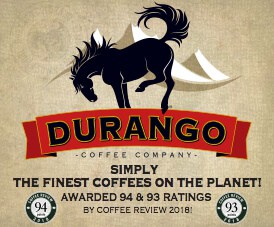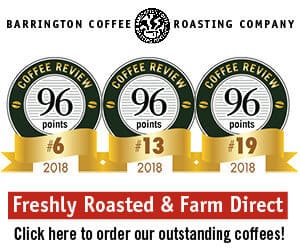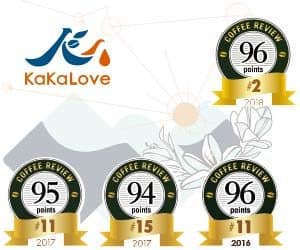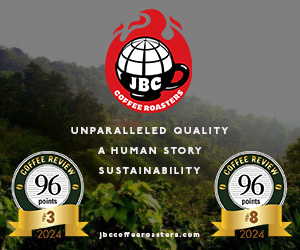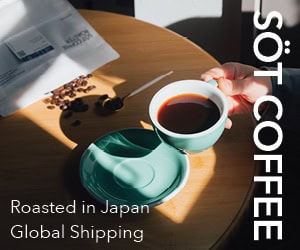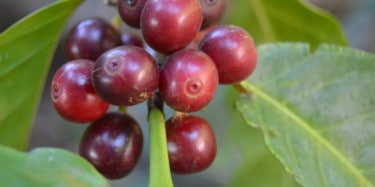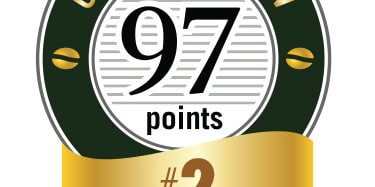Coffees from the Yirgacheffe region are produced from distinctive, largely indigenous Ethiopian varieties of Arabica long grown in the region. Like most southern Ethiopia coffees, this coffee is produced by villagers on small garden plots interplanted with food and other subsistence crops. Processed by the wet or washed method (fruit skin and pulp are removed before drying). JBC Coffee Roasters’
SEARCH RESULTS
Murang’a Kenya
Produced by the Kahuhia farmers' co-operative society and processed at the Kahuhia wet mill. Despite grower discontent and urban encroachment on prime coffee lands, Kenya continues to produce some of the world’s most elegant and distinctive coffees. JBC Coffee Roasters’ vision is simple: “let the coffee lead the way” through sourcing and roasting the best and most unique coffees available and
Murang’a Kenya Espresso
Produced by the Kahuhia farmers' co-operative society and processed at the Kahuhia wet mill. Despite grower discontent and urban encroachment on prime coffee lands, Kenya continues to produce some of the world’s most elegant and distinctive coffees. JBC Coffee Roasters’ vision is simple: “let the coffee lead the way” through sourcing and roasting the best and most unique coffees available and
Talquezalar El Salvador
This coffee tied for the third-highest rating in a tasting of El Salvador coffees for Coffee Review’s August 2019 tasting report. Produced from trees of the bold-bean Pacamara and respected Catuai varieties of Arabica and processed by the traditional ferment-and-wash method by José Alfonso Rodriguez. JBC Coffee Roasters’ vision is simple: “let the coffee lead the way” through sourcing and roasting
El Salvador Coffees 2019: Pacamaras, Bourbons and Change
When we focus a report on a single origin, in this case El Salvador, we try to time the report so that we are testing mainly freshly arrived coffees, coffees that represent the best of the year’s new crop. This year, however, we were a bit too early with our report timing. Many of the coffees we cupped early in July lacked vivacity and aromatic range, suggesting perhaps that they were last year’s
Geisha Village Auction Lot #11
The celebrated Geisha (also spelled Gesha) variety of Arabica first came to the coffee world’s attention in Panama. This particular version, however, is the outcome of efforts to commercialize Gesha in the region from which it originally came. It was grown in western Ethiopia by farmers Adam and Rachel Overton and their indigenous Meanit culture collaborators from seed selected from wild trees of
Banco Gotete Ethiopia
Ethiopia coffees like this one are largely produced from distinctive indigenous Ethiopian varieties of Arabica long grown in their respective regions. Processed by the wet or washed method, in which skin and fruit flesh are removed from the beans or seeds before they are dried. JBC Coffee Roasters’ vision is simple: “let the coffee lead the way” through sourcing and roasting the best and most
Rukera Kenya
This exceptional coffee was selected as the No. 2 coffee on Coffee Review’s list of the Top 30 Coffees of 2019. Produced by the Kenya Coffee Research Institute at its demonstration Rukera Farm from trees of the SL28, SL34, K7, Ruiru 11 & Batian varieties of Arabica and processed by the wet, or washed, method. JBC Coffee Roasters’ vision is simple: “let the coffee lead the way” through sourcing
Rukera Espresso
Produced by the Kenya Coffee Research Institute at its demonstration Rukera Farm from trees of the SL28, SL34, K7, Ruiru 11 & Batian varieties of Arabica and processed by the wet, or washed, method. JBC Coffee Roasters’ vision is simple: “let the coffee lead the way” through sourcing and roasting the best and most unique coffees available and rewarding the farmers who grow those coffees with
Bella Carmona Guatemala
Comprised of coffees from trees of the Caturra, Bourbon and Typica varieties of Arabica and processed by the washed method. JBC Coffee Roasters’ vision is simple: “let the coffee lead the way” through sourcing and roasting the best and most unique coffees available and rewarding the farmers who grow those coffees with substantial premiums. Visit www.jbccoffeeroasters.com or call 608-256-5282 for
La Belleza Colombia
Produced by Miguel Angel Ordonez entirely of the Caturra variety of Arabica and processed by the washed method. JBC Coffee Roasters’ vision is simple: “let the coffee lead the way” through sourcing and roasting the best and most unique coffees available and rewarding the farmers who grow those coffees with substantial premiums. Visit www.jbccoffeeroasters.com or call 608-256-5282 for more
Ninety Plus Gesha Estates JBC Custom Lot #252
This coffee is a collaboration between brothers Michael Johnson of JBC Coffee Roasters and Joseph Brodsky of the Panama producer Ninety Plus Coffee. It was produced entirely from trees of the celebrated Gesha variety of Arabica, and processed by an unconventional, proprietary variation of the wet method in which the whole coffee fruit is subjected to fermentation and washing before drying. JBC
ASOPCAFA Espresso
This coffee was produced by the ASOPCAFA small producer association, a cooperative founded in 2013. It is a wet-processed, or washed, coffee, meaning that the skin and fruit pulp were removed or “washed” from the beans before they were dried. JBC Coffee Roasters’ vision is simple: “let the coffee lead the way” through sourcing and roasting the best and most unique coffees available and rewarding
ASOPCAFA Colombia
This coffee was produced by the ASOPCAFA small producer association, a cooperative founded in 2013. It is a wet-processed, or washed, coffee, meaning that the skin and fruit pulp were removed or “washed” from the beans before they were dried. JBC Coffee Roasters’ vision is simple: “let the coffee lead the way” through sourcing and roasting the best and most unique coffees available and rewarding
JBC Coffee
Kivu Belt Lot 32 Espresso
Produced from trees of local strains of the heirloom Bourbon variety of Arabica. Processed at the Murundo Washing Station by the wet or “washed” method, in which skin and fruit flesh are removed from the beans or seeds before they are dried. JBC Coffee Roasters’ vision is simple: “let the coffee lead the way” through sourcing and roasting the best and most unique coffees available and rewarding
Kivu Belt Lot 32 Rwanda
Produced from trees of local strains of the heirloom Bourbon variety of Arabica. Processed at the Murundo Washing Station by the wet or “washed” method, in which skin and fruit flesh are removed from the beans or seeds before they are dried. JBC Coffee Roasters’ vision is simple: “let the coffee lead the way” through sourcing and roasting the best and most unique coffees available and rewarding
Bufcafe Rwanda
Produced from trees of local strains of the heirloom Bourbon variety of Arabica. Epiphanie Mukashyaka established the now famous Bufcafe washing station or wet mill following the Rwandan genocide. Processed by a Rwandan version of the wet or “washed” method, in which skin and fruit flesh are removed from the beans or seeds before they are dried. JBC Coffee Roasters’ vision is simple: “let the
Banco Gotete Ethiopia
Southern Ethiopia coffees like this one are produced largely from traditional indigenous Ethiopian varieties of Arabica long grown in the region. This lot was processed by the wet or washed method (fruit skin and pulp are removed before drying). Ethiopia coffees processed with this method typically express great aromatic complexity and intensity, with a particular emphasis on floral notes. JBC
ASOPAP Colombia
Produced by the ASOPAP Small Producer Association from trees of the Caturra, Bourbon, Typica and Castillo varieties of Arabica, all wet-processed. JBC Coffee Roasters’ vision is simple: “let the coffee lead the way” through sourcing and roasting the best and most unique coffees available and rewarding the farmers who grow those coffees with substantial premiums. Visit www.jbccoffeeroasters.com or


